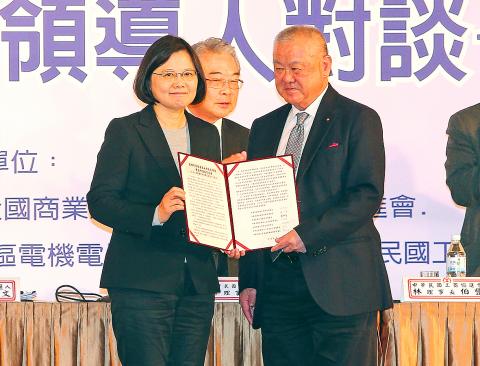Democratic Progressive Party (DPP) presidential candidate Tsai Ing-wen (蔡英文) yesterday told business leaders that her team has prepared extensive energy polices, including the formation of a Cabinet task force to avert any power shortage risks over the next few years.
Tsai made the remarks at her first large-scale discussion with the nation’s six major industrial groups, including the Chinese National Federation of Industries (工總) and the Taiwan Electrical and Electronic Manufacturers’ Association (電電公會).
Yesterday’s meeting was the first forum arranged by industrial groups to discuss insights about relations with China and economic policies with candidates of the three Jan. 16 presidential election tickets.

Photo: CNA
Of the 13 key issues of concern to local industries, how to maintain a stable supply of power topped the list, as Taiwan faces an imminent risk of power supply constraints next year, which could leave companies’ operations in dire condition.
Tsai said she did not expect the nation to suffer from power shortages over the next few years if state-run Taiwan Power Co (Taipower, 台電) can fully carry out its power capacity expansion plans.
A Taipower assessment said the nation could face power shortages, as the company estimates its reserve energy capacity could fall from an estimate of 10.4 percent this year to less than 10 percent of the nation’s needs at peak times next year.
“Our goal is to keep reserve energy capacity above 7.5 percent, which would help us avoid power rationing,” Tsai said.
It is critical for the government to manage power capacity, boost power efficiency, create “green” energy solutions and save energy, Tsai said.
If elected as the nation’s president, Tsai said that she plans to boost the government’s role in tackling energy problems by setting up a task force under the Cabinet.
The Environmental Protection Administration is currently in charge of drawing energy polices.
The task force would be responsible for making energy policies on cutting carbon emissions to meet global standards and reducing energy consumption during peak hours in summer, Tsai said.
The US reduced electricity consumption by 9.2 percent after it, in 2013, implemented electricity rates that favor energy use during off-peak hours and plans to further reduce power consumption by 20 percent by 2020, Tsai said.
The specially designated panel would be in charge of promoting “green” energy, such as solar power; liberalizing the electricity sector; and saving energy, she added.
Expanding the use of smart meters from industrial users to common households and increasing use of energy-efficient equipment and lighting would also be on her agenda, Tsai said.
Talking about her policies on cross-strait relations, Tsai said that she would keep “stable” ties with China.
“Maintaining the ‘status quo’ is my primary and most important direction,” Tsai said.
Taiwan is a democratic nation, Tsai said, adding that she would be following the public’s will by maintaining the “status quo,” without blending any political party’s ideology.
When tackling cross-strait issues, “we will try not to provoke [China]. We will try to communicate with [China]. We do not expect to see anything unexpected. We want to keep relations stable,” Tsai said.

SECURITY: As China is ‘reshaping’ Hong Kong’s population, Taiwan must raise the eligibility threshold for applications from Hong Kongers, Chiu Chui-cheng said When Hong Kong and Macau citizens apply for residency in Taiwan, it would be under a new category that includes a “national security observation period,” Mainland Affairs Council (MAC) Minister Chiu Chui-cheng (邱垂正) said yesterday. President William Lai (賴清德) on March 13 announced 17 strategies to counter China’s aggression toward Taiwan, including incorporating national security considerations into the review process for residency applications from Hong Kong and Macau citizens. The situation in Hong Kong is constantly changing, Chiu said to media yesterday on the sidelines of the Taipei Technology Run hosted by the Taipei Neihu Technology Park Development Association. With

A US Marine Corps regiment equipped with Naval Strike Missiles (NSM) is set to participate in the upcoming Balikatan 25 exercise in the Luzon Strait, marking the system’s first-ever deployment in the Philippines. US and Philippine officials have separately confirmed that the Navy Marine Expeditionary Ship Interdiction System (NMESIS) — the mobile launch platform for the Naval Strike Missile — would take part in the joint exercise. The missiles are being deployed to “a strategic first island chain chokepoint” in the waters between Taiwan proper and the Philippines, US-based Naval News reported. “The Luzon Strait and Bashi Channel represent a critical access

CARROT AND STICK: While unrelenting in its military threats, China attracted nearly 40,000 Taiwanese to over 400 business events last year Nearly 40,000 Taiwanese last year joined industry events in China, such as conferences and trade fairs, supported by the Chinese government, a study showed yesterday, as Beijing ramps up a charm offensive toward Taipei alongside military pressure. China has long taken a carrot-and-stick approach to Taiwan, threatening it with the prospect of military action while reaching out to those it believes are amenable to Beijing’s point of view. Taiwanese security officials are wary of what they see as Beijing’s influence campaigns to sway public opinion after Taipei and Beijing gradually resumed travel links halted by the COVID-19 pandemic, but the scale of

Pope Francis is be laid to rest on Saturday after lying in state for three days in St Peter’s Basilica, where the faithful are expected to flock to pay their respects to history’s first Latin American pontiff. The cardinals met yesterday in the Vatican’s synod hall to chart the next steps before a conclave begins to choose Francis’ successor, as condolences poured in from around the world. According to current norms, the conclave must begin between May 5 and 10. The cardinals set the funeral for Saturday at 10am in St Peter’s Square, to be celebrated by the dean of the College